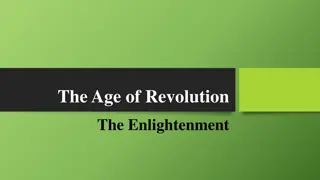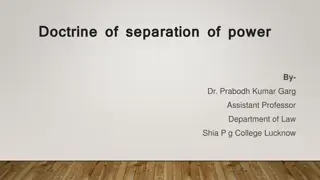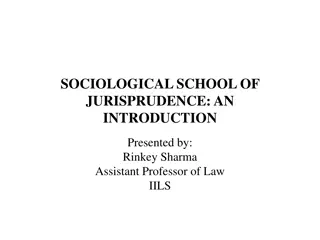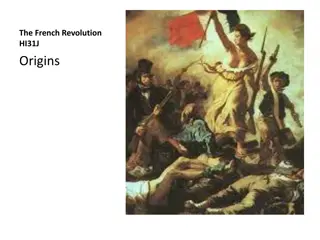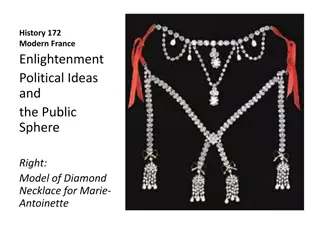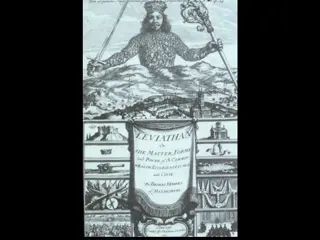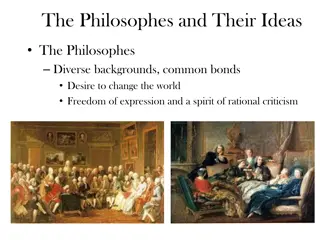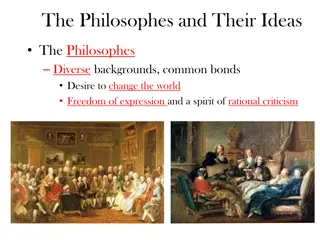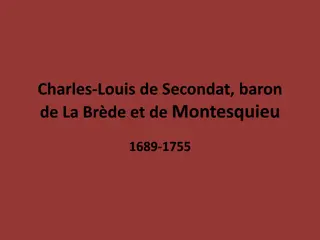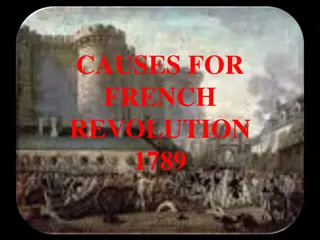Enlightenment Thinkers and Their Ideals
The Age of Revolution was marked by influential Enlightenment thinkers such as Thomas Hobbes, John Locke, Montesquieu, and Jean-Jacques Rousseau. These philosophers explored human nature, government, and society, shaping modern political thought. Hobbes emphasized a pessimistic view, advocating for
2 views • 9 slides
Understanding the Doctrine of Separation of Power by Dr. Prabodh Kumar Garg
The doctrine of separation of power, as elucidated by Dr. Prabodh Kumar Garg, emphasizes the distinct roles of the executive, legislative, and judiciary branches to maintain checks and balances in governance. Originated by Montesquieu, this principle safeguards against tyranny and ensures liberty by
0 views • 27 slides
The Emergence of Sociology: A Historical Overview
Sociology, derived from Latin and Greek roots, has evolved over centuries through various stages, influenced by social, economic, and political factors. Key thinkers like Plato, Aristotle, Hobbes, Locke, Rousseau, Montesquieu, Comte, Durkheim, and Marx have shaped the discipline. The Industrial Revo
1 views • 23 slides
Sociological School of Jurisprudence: An Introduction
Sociology studies human relations within society while jurisprudence focuses on law. The Sociological School of Jurisprudence emphasizes the interconnection between law and society. It emerged in response to the doctrine of Laissez Faire during the Industrial Revolution, advocating for a balance bet
1 views • 6 slides
Enlightenment Philosophers and Their Influence on the French Revolution
The French Revolution was influenced by Enlightenment philosophers like Thomas Hobbes, Rousseau, Voltaire, and Montesquieu. Their ideas on social contracts, collective sovereignty, enlightened absolutism, and the need for checks and balances challenged the traditional Ancien Régime's feudalism, pri
0 views • 26 slides
Enlightenment Political Ideas in Modern France
The Enlightenment era in Modern France brought forth significant political ideas and discussions, including Thomas Hobbes' concept of social contract and Rousseau's emphasis on collective sovereignty. Montesquieu advocated for checks-and-balances in government, while Voltaire promoted enlightened ab
0 views • 21 slides
Causes of the American Revolution and Enlightenment Influence
Explore the causes of the American Revolution, from key events and legislation to influential figures like George Washington and Thomas Jefferson. Discover the impact of Enlightenment thinkers like John Locke and Baron de Montesquieu on the revolutionary ideas that shaped American history.
0 views • 33 slides
Influential Figures in Global History
Explore the lives of historical figures such as Alexander the Great, Montesquieu, Julius Caesar, John Calvin, Catherine the Great, Napoleon Bonaparte, Confucius, and Constantine. These individuals left a mark on different eras through their conquests, philosophies, reforms, and governance, shaping t
0 views • 27 slides
Insights into the Enlightenment Thinkers: Philosophers of Change
The Enlightenment era marked a shift towards reason and enlightenment, with thinkers like Locke, Hobbes, Montesquieu, Rousseau, and Voltaire advocating for progress, natural law, and individual rights. Each philosopher contributed unique ideas to reshape societal structures, challenging traditional
0 views • 18 slides
Enlightenment Thinkers and Their Impact on Society
Explore the ideas and influence of key Enlightenment thinkers such as Montesquieu, Condorcet, Voltaire, and John Locke. Discover their groundbreaking works and beliefs on freedom, governance, equality, and religious tolerance, which shaped the American and French revolutions and continue to resonate
0 views • 31 slides
Enlightenment Philosophes and Their Revolutionary Ideas
Enlightenment philosophes such as Montesquieu, Condorcet, Voltaire, John Locke, Diderot, and Cesare Beccaria came from diverse backgrounds but shared a common desire to change the world. They advocated for freedom of expression, rational criticism, religious tolerance, separation of powers, educatio
0 views • 16 slides
Evolution of Political Ideas and Influences on American Founding
In the history of politics, major ideas like laws of nature, unalienable rights, divine right of kings, social contract theory, and rights of resistance have influenced the American founding. Various traditions such as Judeo-Christian, English common law, Enlightenment, and republicanism played a si
0 views • 68 slides
Understanding Montesquieu's View on Democracy and Law
Montesquieu, a notable French nobleman and influential figure in Western culture, delved into essential aspects of democracy, liberty, and separation of powers. Through his works like "The Spirit of Laws," he emphasized the importance of laws in societies and the relationship between laws and variou
0 views • 12 slides
Montesquieu: Influential Thinker and Writer in 18th Century France
Explore the life and works of Charles-Louis de Secondat, Baron de La Brède et de Montesquieu, a prominent figure of the Enlightenment era. Delve into his famous works such as "The Spirit of the Laws" and "Persian Letters," analyzing his thoughts on despotism, law, happiness, and tyranny. Discover h
0 views • 8 slides
The Political Economy of Borders and the Future of Catalonia
Explore the political dynamics behind the formation and breakup of sovereign states, focusing on Catalonia's independence aspirations amidst the backdrop of increasing global statehood. Key thinkers like Aristotle, Montesquieu, and Beccaria offer insights on the challenges and benefits of nation siz
0 views • 45 slides
Causes of the French Revolution in 1789
The French Revolution of 1789 was sparked by a combination of social, administrative, political, intellectual, financial, and immediate causes. Feudalism, a rotten administrative system, absolute monarchy, intellectual influences from philosophers like Montesquieu and Rousseau, financial bankruptcy,
0 views • 10 slides
The Enlightenment and Absolutism: Key Concepts and Figures
The period saw significant developments, including the Scientific Revolution emphasizing reason and systematic observation, leading to the expansion of scientific knowledge. Absolutism showcased monarchs' control, like Peter the Great's westernization of Russia and Louis XIV's Palace of Versailles.
0 views • 22 slides
